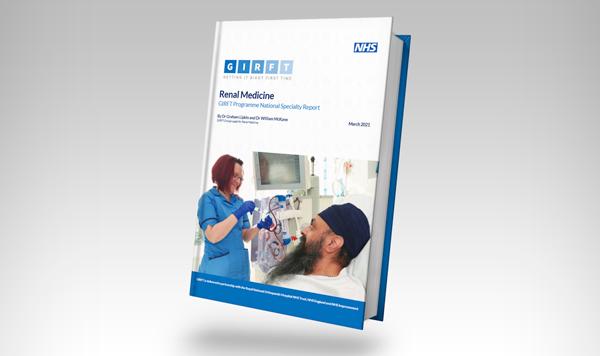Ensuring more kidney patients have the opportunity for dialysis at home, and creating greater and equitable access to kidney transplantation, are among the key measures outlined in a new national report for renal medicine from the Getting It Right First Time (GIRFT) programme.
The report, written by Dr Graham Lipkin and Dr William McKane, makes 18 recommendations to improve NHS services for hundreds of thousands of patients – those with CKD or receiving RRT, and those with AKI. It is based on insight from extensive benchmarked data as well as visits to all adult renal centres in England, including transplant centres, and is supported by professional societies and kidney patient charities*.
A key recommendation focuses on expanding access to home dialysis. The report recommends the promotion of home dialysis therapy to ensure it is offered to all suitable patients, reaching a minimum target rate of 20% of dialysis patients in every renal centre. In England 58,000 patients receive renal replacement therapy (RRT) - increasing that number can improve their quality of life and independence, as well as offering good value for the NHS.
The GIRFT report outlines seven actions to increase home therapy rates, including enhanced patient training facilities and staffing, and improved peritoneal catheter insertion services, to help achieve the minimum 20% target.
Building on lessons learned from the COVID-19 pandemic, the report also targets several other key areas for improvement, including:
Equity and improved access to kidney transplantation: While transplant numbers have increased in the past decade (to 3,597 in 2018/19), there is significant geographical variation in transplant rates from living donors (LD) between patients cared for in referring centres compared with those cared for at units which also provide transplantation. There is also variation in access to transplants based on ethnicity.
GIRFT recommends a range of measures to create better access, including improved tracking of patients with CKD in advanced kidney care clinics to monitor transplant candidates and potential donors; establishing a dedicated nurse specialist transplant workforce in all renal kidney centres; and additional support for patients of all ethnicities to ensure equal access to LD transplants.
Improved management of patients with acute kidney injury: Up to 20% of patients admitted to hospital as an emergency in England are affected by acute kidney injury (AKI). Of these, 18% in hospital or community care die within 30 days. The GIRFT review found significant delays in transfer times, leading to poorer patient outcomes. The report calls for mandatory patient transfer to a renal centre within 24 hours of the decision being made by the receiving consultant nephrologist.
The quality of care for AKI patients and the length of time they stay in hospital can also be improved if all acute trusts follow the NICE patient safety measures for the prevention, detection and management of AKI. GIRFT has worked with the UK Kidney Association and UK Renal Registry to develop benchmarked AKI outcomes for acute hospitals in England to support ongoing improvement.
Improved kidney outpatient delivery: Reforming outpatient clinics to improve patients’ access, including to specialist services such as vasculitis clinics and renal obstetric clinics, and to reduce face-to-face consultations where suitable.
Delivering target rates for vascular access: A radical review of haemodialysis vascular access provision is recommended to help deliver a first class care for patients. Current provision is below targets set by the clinical community and is not improving. The GIRFT report outlines a series of ten actions to help define and deliver target vascular access rates.
The national GIRFT programme – part of an aligned set of programmes within NHSE/I – is designed to improve the treatment and care of patients through in-depth review of services, benchmarking, and presenting a data-driven evidence base to support change.
The new GIRFT report is already helping to drive improvements in care. Its recommendations have informed and are closely aligned with the ten high-impact changes outlined by the Renal Service Transformation Programme (RSTP). This collaboration offers an unparalleled opportunity to work jointly on delivering improving patient care nationally, addressing variation and inequality, and redesigning services in renal medicine.
Overall, measures in the report have the potential to result in major clinical benefits and cost efficiencies of between £28.8m and £52.3m a year, although not all will be cash-releasing.
Dr Lipkin said: “These recommendations were developed through close collaboration with patients, clinicians and health service commissioners. Addressing the important areas of unwarranted variation identified in this report would represent a major win for all. It will ensure that patient experience and shared decision making are central to service delivery, resulting in better outcomes and enhanced patient care. For the NHS as a whole, these changes mean improved healthcare value, improved sustainability and reduced costs.”
Dr McKane added: “Working in collaboration with NHS England’s Renal Service Transformation Programme (RSTP), we now have a significant opportunity to level up patient outcomes and further improve care – the most positive change for the renal community in over a decade.”
The GIRFT report is available here
